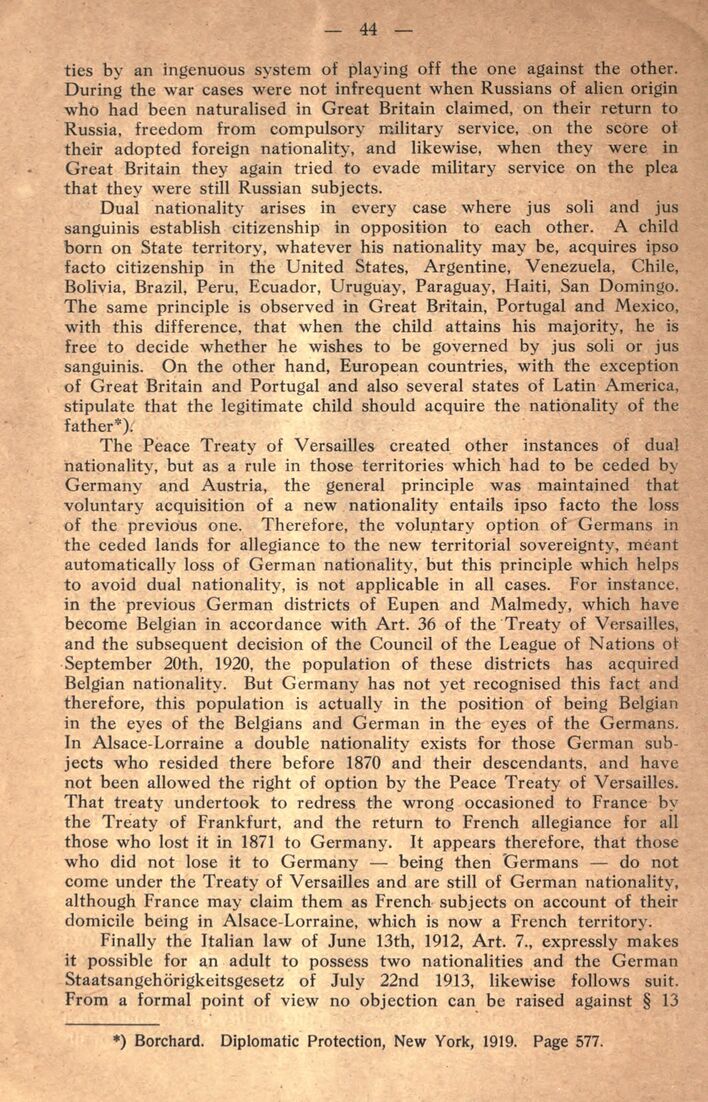
Full resolution (JPEG) - On this page / på denna sida - Chapter VI. Nationality. A plea for Reform. Paper read at a Committee on Nationality appointed by the International Law Association at 2 King's Bench Walk, Temple, London on February 24th 1922

<< prev. page << föreg. sida << >> nästa sida >> next page >>
Below is the raw OCR text
from the above scanned image.
Do you see an error? Proofread the page now!
Här nedan syns maskintolkade texten från faksimilbilden ovan.
Ser du något fel? Korrekturläs sidan nu!
This page has never been proofread. / Denna sida har aldrig korrekturlästs.
— 44 —. 4
ties by an ingenuous system of playing off the one against the other.
During the war cases were not infrequent when Russians of alien origin
wTho had been naturalised in Great Britain claimed, on their return to
Russia, freedom from compulsory military service, on the score of
their adopted foreign nationality, and likewise, when they were in
Great Britain they again tried to evade military service on the plea
that they were still Russian subjects.
Dual nationality arises in every case where jus soli and jus
sanguinis establish citizenship in opposition to each other. A child
born on State territory, whatever his nationality may be, acquires ipso
facto citizenship in the United States, Argentine, Venezuela, Chile,
Bolivia, Brazil, Peru, Ecuador, Uruguay, Paraguay, Haiti, San Domingo.
The same principle is observed in Great Britain, Portugal and Mexico,
with this difference, that when the child attains his majority, he is
free to decide whether he wishes to be governed by jus soli or jus
sanguinis. On the other hand, European countries, with the exception
of Great Britain and Portugal and also several states of Latin America,
stipulate that the legitimate child should acquire the nationality of the
father"): . * i UHB
The Peace Treaty of Versailles created other instances of dual
nationality, but as a rule in those territories which had to be ceded by
Germany and Austria, the general principle was maintained that
voluntary acquisition of a new nationality entails ipso facto the loss
of the previous one. Therefore, the voluntary option of Germans in
the ceded lands for allegiance to the new territorial sovereignty, meant
automatically loss of German nationality, but this principle which helps
to avoid dual nationality, is not applicable in all cases. For instance,
in the previous German districts of Eupen and Malmedy, which have
become Belgian in accordance with Art. 36 of the’Treaty of Versailles,
and the subsequent decision of the Council of the League of Nations of
September 20th, 1920, the population of these districts has acquired
Belgian nationality. But Germany has not yet recognised this fact and
therefore, this population is actually in the position of being Belgian
in the eyes of the Belgians and German in the eyes of the Germans.
In Alsace-Lorraine a double nationality exists for those German
subjects who resided there before 1870 and their descendants, and have
not been allowed the right of option by the Peace Treaty of Versailles.
That treaty undertook to redress the wrong occasioned to France by
the Treaty of Frankfurt, and the return to French allegiance for all
those who lost it in 1871 to Germany. It appears therefore, that those
who did not lose it to Germany — being then Germans — do not
come under the Treaty of Versailles and are still of German nationality,
although France may claim them as French subjects on account of their
domicile being in Alsace-Lorraine, which is now a French territory.
Finally the Italian law of June 13th, 1912, Art. 7., expressly makes
it possible for an adult to possess two nationalities and the German
Staatsangehorigkeitsgesetz of July 22nd 1913, likewise follows suit.
From a formal point of view no objection can be raised against § 13
*) Borchard. Diplomatic Protection, New York, 1919. Page 577.
<< prev. page << föreg. sida << >> nästa sida >> next page >>